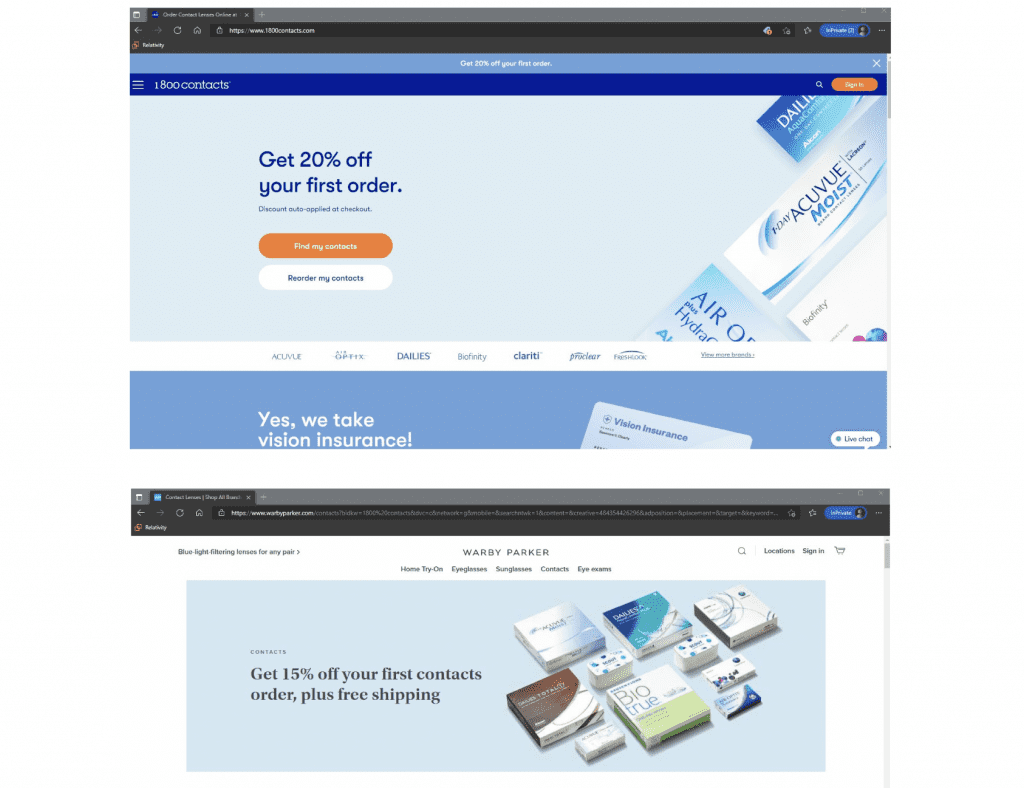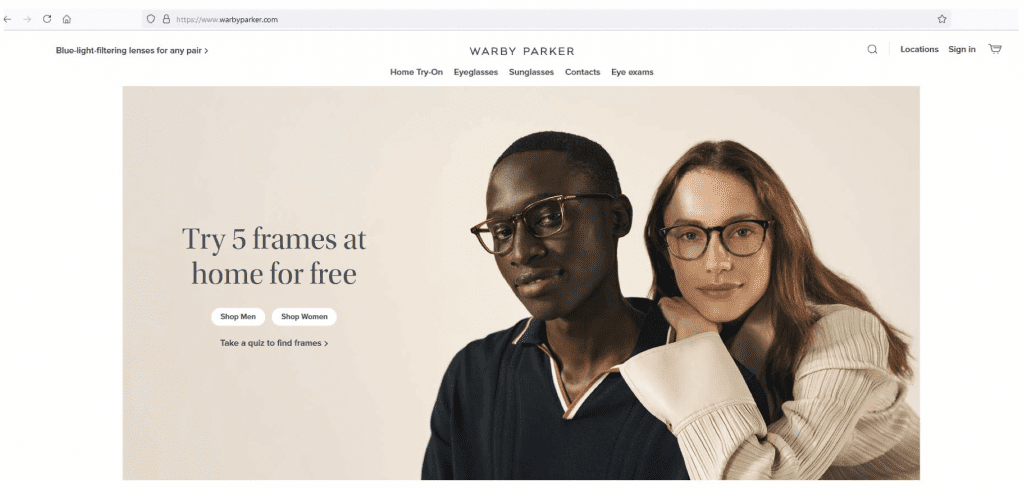Warby Parker is looking to tap into the pool of millions of customers that 1-800 Contacts has amassed as a result of more than a decade in business and hundreds of millions of dollars worth of “advertising, marketing, and promotion,” the Draper, Utah-based contacts company argues in a new lawsuit. According to the complaint that it filed in a New York federal court on Wednesday, 1-800 Contacts asserts that JAND, Inc., d/b/a Warby Parker is engaging in “continuing trademark infringement, unfair competition, and deceptive advertising practices” in an effort to attract consumers given its status as a “new entrant in the online contact lens marketplace.”
In the newly-filed complaint, 1-800 Contacts alleges that in light of its “relatively low consumer recognition for contacts,” and “instead of independently developing its own brand awareness related to the online sales of contacts,” direct-to-consumer pioneer Warby Parker “has devised a plan to confuse and mislead consumers who seek to go to 1-800 Contacts’ online store.” Primarily a retailer of eyeglasses, Warby Parker is “trad[ing] off 1-800 Contacts’ brand name and reputation through unauthorized bidding on 1-800 Contacts’ trademarks as search engine keywords that generate Warby Parker advertisements,” 1-800 Contacts claims.
1-800 Contacts alleges that Warby Parker “bids on 1-800 Contacts’ distinctive trademarks to make search engine keyword purchases with Google and other search engines, [and] by doing so, arranges to place its own ads at or near the top of the Google search results page that appears after a consumer searches for 1-800 Contacts or one of its trademarks.” The real kicker for 1-800 Contacts, however, is what comes next: Once consumers are presented with Warby Parker ads that “appear to be from 1-800 Contacts or an approved affiliate, licensee, or associate of 1-800 Contacts,” Warby Parker links those ads to “a Warby Parker landing webpage that deceptively and intentionally mimics the look and feel of 1-800 Contacts’ website, including through use of a confusingly similar color scheme, layout, and discount offering, along with imagery evoking the 1800contacts.com website.”
Specifically, 1-800 Contacts claims that the link takes consumers to “a unique warbyparker.com landing webpage that is different from the look and feel of Warby Parker’s homepage and that features coloring and a presentation that is confusingly similar to 1-800 Contacts’ website.” Among the elements that make up the allegedly “distinctive look and feel” of the 1-800 Contacts site: “the prominently featured shade of light blue on its homepage,” as well as “the light blue rectangular shaded box that spans most of the screen in a horizontal configuration and displays representative contact lens product packages to the right of a discount offer to ‘Get 20% off your first order.’”

In late December 2020, 1-800 Contacts claims that “Warby Parker revamped the ad [home] page color scheme and layout to even more closely resemble the updated 1800contacts.com website homepage layout adopted in April 2020 … by transitioning the blue rectangular box [on the homepage] from one shade of blue to a lighter shade of blue that is nearly the same shade as the light blue rectangular box displayed on 1-800 Contacts’ standard website homepage.” More than that, Warby Parker also allegedly “began displaying—in the light blue rectangular box—contact lens product packaging images and a discount offer to ‘Get 15% off your first contacts order.’”
Warby Parker’s plan is particularly harmful, per 1-800 Contacts, as it “creates a particularly significant likelihood of confusion for consumers who engage in navigational searches,” the primary purpose of which is to locate a specific website. Because consumers are being served Warby Parker ads when they search for the 1-800 Contacts brand name, as opposed to merely a general product name, the plaintiff asserts that Warby Parker “intentionally deceives and confuses consumers, who have a reasonable and legitimate expectation that their searches for the well-known 1-800 CONTACTS marks will lead them to 1-800 Contacts’ website, products, and services, not to a page created by a competitor seeking to pass itself off as 1-800 Contacts or an affiliate or licensee of 1-800 Contacts.”
In addition to confusing consumers, Warby Parker “has usurped and continues to usurp the valuable goodwill that 1-800 Contacts has built in its marks through the high quality of its offerings, its exceptional customer service, and its substantial investments in advertising, marketing, and promotions,” the online-only contacts-maker claims.

With the foregoing in mind, 1-800 Contacts sets out claims of trademark infringement and unfair competition, and is seeking unspecified monetary damages, as well as injunctive relief to bar Warby Parker – which is slated to go public in the near future – “using any of the 1 800 CONTACTS trademarks or any confusingly similar mark, name, domain name, or colorable imitation thereof,” in connection with its business, among other things.
The case is the latest in a running list of trademark actions initiated by 1-800 Contacts against competitors for bidding on its trademark-protected name as a keyword, settling a large majority of those cases, and giving rise to the Federal Trade Commission taking on the contacts company on the basis that some of the restrictions in 1-800 Contacts’ settlement agreements unfairly restricted competitors’ search advertising practices.
More than Just Keywords
While “competitive keyword advertising lawsuits are still stupid, and they are still typically doomed in court,” as Santa Clara University School of Law professor Eric Goldman put it not too long ago, this case is a bit more interesting than a run of the mill keyword matter thanks to 1-800 Contacts claims that Warby Parker is going a step beyond bidding for its trademarks in a search capacity, and utilizing a website that looks like the 1-800 Contact site – which differs in color, layout, and content from Warby Parker’s main e-commerce homepage – in order to dupe consumers.
The case is also intriguing, as it is not the only recent matter in which one DTC company has accused another of ripping off the look and feel of its website. You may recall that in a short-lived trademark and copyright case that Daily Harvest filed against Revive in April 2020, the mighty and heavily funded DTC player accused its fellow frozen food company of scheming to “free-ride [on its] coattails” by adopting “an identical and confusingly similar website design, content, product packaging, [and] images” as it sought to expand its reach from its native Canada into the U.S. market.
Just like in the Daily Harvest case, which settled less than a year after it was filed, if 1-800 Contacts’ history is any indication, this case will settle out of court, too. Nonetheless, both cases are striking, as they drive home the point that many companies’ most valuable components are not necessarily the products, themselves, but branding-specific assets, including “distinctive” e-commerce sites that they use to sell those products.
As I noted in connection with the Daily Harvest case, this emphasis on branding is, of course, not new to or exclusive to DTC players, and in the DTC space, the products, themselves, certainly are not irrelevant. At the same time, though, it is difficult to ignore the fact that one of the key distinguishing factors for many of these DTC companies is not necessarily earth-shattering, impossible-to-get-elsewhere products, but the branding – and marketing – and related elements at play. This has likely been made only more important in the wake of the COVID-19 pandemic and the spike on e-commerce sales, which is expected to endure not only generally (as consumers have become significantly more comfortable purchasing anything and almost everything online), but also in light of the spread of new variants, which are swiftly diminishing consumer confidence in frequenting brick-and-mortar stores when they could achieve the same result online.
A rep for Warby Parker was not immediately available for comment.
The case is 1-800 Contacts, Inc. v. Jand, Inc. d/b/a Warby Parker, 1:21-cv-06966 (SDNY).













